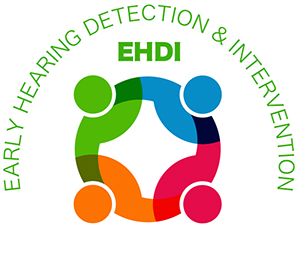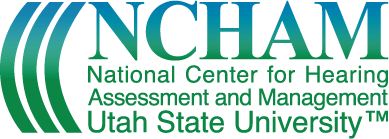Last Modified: 12/13/2022
Early Intervention

The information in this section is intended for parents of children with hearing loss and professionals working with families. When a child is identified with a hearing loss, parents and family members often seek new knowledge and resources to help them understand issues related to hearing loss and to make decisions for their families and children. Early intervention professionals may also need additional resources to help them assist families.
Early intervention is a broad area and can be challenging to navigate. In fact, in a letter [PDF] sent in July 2006 to all state early intervention coordinators, officials in the federal government noted that “many young children with hearing loss may not be receiving the early intervention or other services they need in a timely manner that will enable them to enter preschool and school ready to succeed.”
The information included in this section is designed to provide both basic information and resources to assist in finding additional information so that parents and other concerned individuals can advocate for improved early intervention services for infants and young children with hearing loss. Additional resources for achieving this goal include your State Department of Health and/or the agency in your state responsible for early intervention services. Many states have also developed parent resource manuals and have staff available to assist parents.
As with any new area of learning, understanding all the vocabulary associated with early intervention can often be a challenge. An explanation of the terms associated with hearing, communication, and early intervention, is available on the Texas Connect website at UT Dallas/Callier Center for Communication Disorders. (*Español: Términos & Definiciones)
Basic information on hearing loss including how the ear works, types of hearing loss, audiograms, and simulations of varying levels of hearing loss is available through Boys Town National Research Hospital website, My Baby’s Hearing: All About Hearing Loss (*Español: Todo Sobre La Perdida Auditiva)
EI SNAPSHOT
Learn about a comprehensive EI multi-method study from the perspective of families with children who are DHH, EI providers and audiologists, family-to-family organizations, and personnel preparation programs.
Early Intervention Resource Pages
- Early Intervention System Information
- Early Intervention Guidelines and Requirements
- Importance of Early Communication and Communication Options
- Hearing, Amplification, and Cochlear Implants
- Assessment Tools for Communication/Language and Auditory Development
- Early Intervention Curriculum and Training Materials
- Additional Early Intervention Materials, Web Sites, and Presentations
Related Pages on infanthearing.org
NCHAM Early Intervention Materials
- Factors Related to Eligibility for IDEA Part B Preschool Services:
- NCHAM has developed a new document that provides insight into state variability in eligibility for IDEA Part B preschool services for children who are D/HH. Aspects of Eligibility for Children who are Deaf or Hard of Hearing under IDEA Part B Section 619 Preschool: A Survey Report [PDF] shares information provided from 32 state and 2 territory Part B Section 619 Preschool programs, highlighting state differences in eligibility requirements and eligibility determination process. This document may be of interest to EHDI partners and families.
- Eligibility and Service Delivery Policies: Differences Between IDEA Part C and IDEA Part B [PDF]
- Part C Eligibility Considerations For Infants and Toddlers Who Are Deaf or Hard of Hearing [PDF]
- Understanding the IDEA Part C Regulations: the Role of EHDI [PDF]
- EHDI E-Book Chapter 14: Amplification & Hearing Assistive Devices (HAT) [PDF]
- EHDI E-Book Chapter 18: Family-Centered Early Intervention Programming for Infants & Toddlers Who Are Deaf or Hard of Hearing [PDF]
- EHDI E-Book Chapter 24: The Role of Educational Audiologists in the EHDI Process [PDF]
Other Materials
- 2014 ITCA Finance Survey [PDF]
- Side-By-Side of IDEA and FERPA Confidentiality Provisions
- The U.S. Department of Education recently published IDEA and FERPA Confidentiality Provisions [PDF] (June 2014), a side-by-side comparison of the primary legal provisions and definitions in the Individuals with Disabilities Education Act (IDEA) Parts B and C and the Family Educational Rights and Privacy Act (FERPA) that relate to the confidentiality of personally identifiable information of children served under the IDEA.
- Use of Diagnosed Conditions for IDEA Part C Early Intervention Program Eligibility [PPTX]
- This session describes how current diagnosed conditions eligibility criteria policies and practices create variable access to early intervention (EI) across states. This has the potential for delays in access to EI within state. The presenters proposes action steps to remedy policy deficiencies. The presentation is intended to facilitate discussion among the audience and presenters focusing on balancing the need to increase early identification and continue providing effective EI services to children and families.
Other Early Intervention Resources and Websites
- Early Intervention Network provides professionals with five evidence-based practices to support linguistic competence in children who are deaf or hard of hearing
- Cochlear Implants – Navigating a Forest of Information, One Tree at a Time [PDF]
- Early Childhood Techinical Assistance Center (ECTA Center)
- Office of Special Education and Rehabilitative Services (OSERS)
- The Center for Childhood Deafness at Boys Town National Research Hospital
- This internationally recognized center of excellence for applied research provides clinical services as well as distance training opportunities in early intervention strategies and rehabilitative services for children with hearing loss, visual impairment and related communication disorders and their families.


